Samir Chadha at the European Review of Books:

In Vigdis Hjorth’s novels, to be functional is to be underwhelming. In Long Live the Post Horn!, for instance, (published in 2012 in Norwegian, translated into English in 2020), the protagonist receives from her boyfriend (himself underwhelming), the « shared present » of a well-reviewed vibrator. The wrapping is enticing, maybe, « in glossy black paper with a purple ribbon », but the maiden voyage is not so successful:
It took longer than usual for him to come, then he rolled over and took the gadget out of me, it continued to hum and vibrate, he tried to turn it off but couldn’t, he held it up under the lamp on the bedside table again, the humming was louder now, he still wasn’t able to turn it off, finally he got up and put it in the hall, but we could still hear it, he got up again and put it even further away, maybe in the kitchen drawer.
The vibrator is a gadget, and in the worst sense: gimmicky, in poor taste, both garish (it is purple) and coldly functional. That’s what makes it egregious: it is too reliable, performing recognisably even when there’s nothing to perform on. It’s not the relationship’s only underwhelming gadget; she’s not long ago received an engagement ring.
More here.
Enjoying the content on 3QD? Help keep us going by donating now.

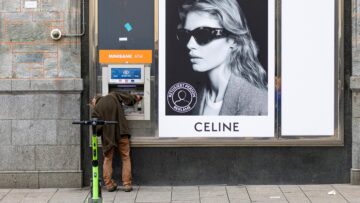 Finally, the vacation you’ve been waiting for is happening tomorrow. You and your friends are going on a two-week cruise, free of responsibilities and full of fun. You’re starting to pack when you feel a little bit lightheaded. You don’t think much of it because you’ve been stressed lately trying to get ready for the trip. Later, you start coughing. Probably just allergies, you think to yourself as you go about your day. When you wake up in the morning – the day of the trip – you have a sore throat and chills. You briefly think to yourself: This feels like it could be COVID. Maybe I should take a self-test. You start walking to your medicine cabinet, but then you pause. If you test positive, you’ll feel obliged to isolate from others and miss the trip. You’ve spent so much time thinking about the trip and paid a lot for the tickets. Your friends will be disappointed. I’m sure I’m fine. You decide it’s better not to know.
Finally, the vacation you’ve been waiting for is happening tomorrow. You and your friends are going on a two-week cruise, free of responsibilities and full of fun. You’re starting to pack when you feel a little bit lightheaded. You don’t think much of it because you’ve been stressed lately trying to get ready for the trip. Later, you start coughing. Probably just allergies, you think to yourself as you go about your day. When you wake up in the morning – the day of the trip – you have a sore throat and chills. You briefly think to yourself: This feels like it could be COVID. Maybe I should take a self-test. You start walking to your medicine cabinet, but then you pause. If you test positive, you’ll feel obliged to isolate from others and miss the trip. You’ve spent so much time thinking about the trip and paid a lot for the tickets. Your friends will be disappointed. I’m sure I’m fine. You decide it’s better not to know.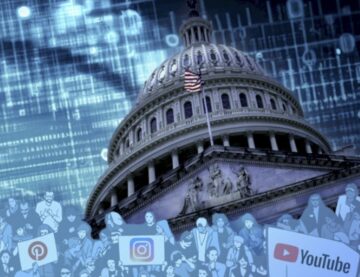 A senior researcher at Microsoft tells me that the sale of TikTok is more momentous to the fate of American democracy than the mobbing of the Capitol on January 6, 2021. He argues that the latter was a circumscribed event, while the enforced sale of TikTok will put the eyeballs of 170 million American users under the control of one of the two or three bidders already wealthy enough to buy it—such as Elon Musk. I find this view awfully grim, not because Musk has too many conflicts of interest to be a benign presence in government but because I find it dismaying that “American democracy” should occur in the same sentence with “TikTok,” let alone be identified with it. If the fate of American democracy rests on the ownership of TikTok, then maybe the towel has already been thrown in.
A senior researcher at Microsoft tells me that the sale of TikTok is more momentous to the fate of American democracy than the mobbing of the Capitol on January 6, 2021. He argues that the latter was a circumscribed event, while the enforced sale of TikTok will put the eyeballs of 170 million American users under the control of one of the two or three bidders already wealthy enough to buy it—such as Elon Musk. I find this view awfully grim, not because Musk has too many conflicts of interest to be a benign presence in government but because I find it dismaying that “American democracy” should occur in the same sentence with “TikTok,” let alone be identified with it. If the fate of American democracy rests on the ownership of TikTok, then maybe the towel has already been thrown in.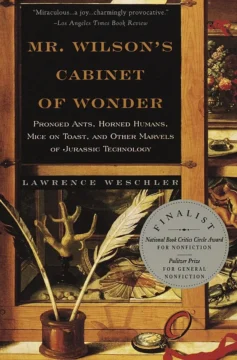 Many readers of this particular Substack may already realize that its very name—“Wondercabinet”—wends back, in terms of my own lifework, to my days covering the then-barely-nascent Museum of Jurassic Technology, for what became my 1995 book
Many readers of this particular Substack may already realize that its very name—“Wondercabinet”—wends back, in terms of my own lifework, to my days covering the then-barely-nascent Museum of Jurassic Technology, for what became my 1995 book 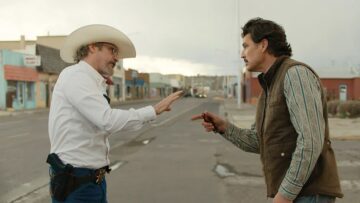 Eddington
Eddington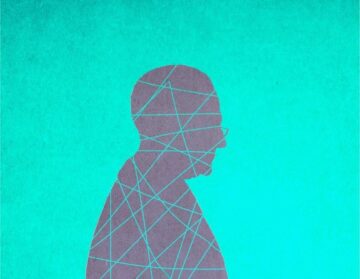 We’re living longer than ever—but those extra years aren’t unfolding the way many hoped. Instead of later years spent thriving, millions are instead facing
We’re living longer than ever—but those extra years aren’t unfolding the way many hoped. Instead of later years spent thriving, millions are instead facing  It’s now almost a reflex: An election is held, and someone pushes the big, red Death of Democracy panic button. When Donald Trump won in 2016, liberals saw a gold-plated Adolf Hitler in a red baseball cap. Then Joe Biden took over and conservatives warned of Joseph Stalin or Pol Pot reborn, an America where your kids would be forced to go to gay camp and pray to RuPaul before lunch. (They’re panicking again with Zohran Mamdani in New York’s mayoral race.) Now, we have Trump redux. The hysterias flip, but the impulse stays the same: to imagine top-down tyranny as a looming catastrophe.
It’s now almost a reflex: An election is held, and someone pushes the big, red Death of Democracy panic button. When Donald Trump won in 2016, liberals saw a gold-plated Adolf Hitler in a red baseball cap. Then Joe Biden took over and conservatives warned of Joseph Stalin or Pol Pot reborn, an America where your kids would be forced to go to gay camp and pray to RuPaul before lunch. (They’re panicking again with Zohran Mamdani in New York’s mayoral race.) Now, we have Trump redux. The hysterias flip, but the impulse stays the same: to imagine top-down tyranny as a looming catastrophe. It is no great secret that the undergraduate English department is in a state of decline: a shrinking number of English majors, a decrease in faculty, and a reputation of unemployability and irrelevance. Much has been written about this decline. Nathan Heller’s recent New Yorker piece,
It is no great secret that the undergraduate English department is in a state of decline: a shrinking number of English majors, a decrease in faculty, and a reputation of unemployability and irrelevance. Much has been written about this decline. Nathan Heller’s recent New Yorker piece,  One of the biggest stories in science is quietly playing out in the world of abstract mathematics. Over the course of last year, researchers fulfilled a decades-old dream when they unveiled a proof of the geometric Langlands conjecture — a key piece of a group of interconnected problems called the Langlands programme. The proof — a gargantuan effort — validates the intricate and far-reaching Langlands programme, which is often hailed as the grand unified theory of mathematics but remains largely unproven. Yet the work’s true impact might lie not in what it settles, but in the new avenues of inquiry it reveals.
One of the biggest stories in science is quietly playing out in the world of abstract mathematics. Over the course of last year, researchers fulfilled a decades-old dream when they unveiled a proof of the geometric Langlands conjecture — a key piece of a group of interconnected problems called the Langlands programme. The proof — a gargantuan effort — validates the intricate and far-reaching Langlands programme, which is often hailed as the grand unified theory of mathematics but remains largely unproven. Yet the work’s true impact might lie not in what it settles, but in the new avenues of inquiry it reveals.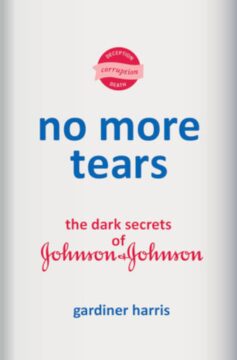 N
N